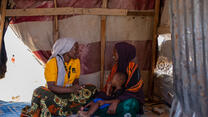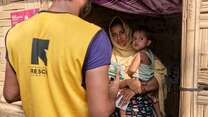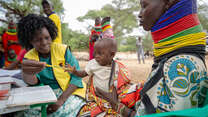Conflict and crises weaken health systems, deplete essential health resources, and consequently lead to staggeringly high rates of maternal and newborn mortality. Pregnancy and childbirth do not stop in times of crisis, and neither should access to high-quality, life-saving care. Many of these deaths can be prevented with accessible and cost-effective interventions, yet these often remain under resourced and underdelivered in humanitarian settings, where heath systems are disrupted, and human resources are insufficient.
OUR APROACH
The International Rescue Committee (IRC) is committed to ensuring safe pregnancy and childbirth from the earliest stages of crisis through recovery and development by delivering essential maternal and newborn healthcare (MNH) in 25 countries across Africa, Asia, Latin America, and the Middle East.
We work to achieve our goal of ensuring every mother and newborn can survive and thrive, even in times of crisis, through MNH program implementation, emergency response, research and innovation, and advocacy and partnerships. Underlying these areas are our guiding principles: a feminist approach, shifting power, and holistic care with a focus on the mother-baby dyad.
WHAT WE DO
Respond to emergencies: MNH is a core part of the IRC’s emergency health package. Within days of an emergency, we design responses that deliver the Minimum Initial Service Package in Crisis Situations (MISP), which prioritizes life-saving services with an emphasis on Emergency Obstetric and Neonatal Care (EmONC) to ultimately prevent maternal and newborn morbidity and mortality. As crises evolve from the emergency to recovery stage, the IRC invests in supporting rights-based policies, challenging harmful gender norms, and working with government and civil society partners to strengthen the health system. From 2013-2021, the IRC implemented the MISP in 19 acute emergencies across 15 countries in Africa, Asia, Europe, Latin America, and the Middle East.
Provide comprehensive MNH care in protracted crises: The IRC aims to improve quality of care through the pregnancy, childbirth, and postpartum periods at all levels of the health system, from community to facility and through referral pathways. This is done through context-appropriate service delivery, data use for action, quality assurance, capacity building, and supportive supervision. Services are available through IRC-run and –supported health facilities, including mobile clinics, and through partnerships with Ministries of Health, local authorities, UN agencies and implementing partners, and Health Cluster mechanisms. Recognizing the importance of delivering holistic care in crisis, we continue to expand access to care by exploring new IPC and WASH practices for MNH, delivering integrated services for MNH and nutrition, and designing responses that support maternal mental health.
Generating evidence and learning: The IRC has identified sexual, reproductive, maternal, and newborn health and rights (SRMNH) as a Global Research and Innovation Priority including a commitment to invest in innovations and conduct rigorous research to design, test, and scale client-centered solutions for delivering care in the last mile. Through the IRC’s flagship MNH research project – the EQUAL research consortium – we are working with partners to generate evidence that will strengthen community, facility and health-system efforts to reduce preventable maternal and perinatal mortality in conflict-affected settings. This includes a multi-pronged initiative to design, implement, and evaluate the delivery of community-based MNH care. The IRC’s research expands to other areas of MNH including generating evidence to improve referral pathways and mortality surveillance while continuing to advocate for the inclusion of humanitarian settings within research studies across the sector.
Advocate with partners: We are actively advocating for changes in national and global policy to see the needs of marginalized populations in the areas the IRC serves prioritized. We engage stakeholders at every level, from national governments to humanitarian decision-making mechanisms, to donors and beyond, to see increased investment, support, and accountability for achieving MNH targets in humanitarian and fragile contexts. We are committed to partnering with others to advance our shared priorities including as a steering committee member of the Inter-Agency Working Group on Reproductive Health in Crises (IAWG), co-chair of the IAWG MNH sub-working group, host of the IAWG Newborn Initiative, and co-lead of the Global Health Cluster’s SRH Task Team, among participation in many other networks.
Learn more here:
- IRC's Maternal and Newborn Health Brief: a brochure about the IRC's work to improve maternal and newborn health outcomes across the humanitarian and fragile settings where we work.
- IRC's Sexual and Reproductive Health and Rights Brief: a brochure about our comprehensive SRHR work across humanitarian and fragile settings.
- Community-Based MNH Care Brief: a brief about IRC’s multi-pronged initiative to expand access to care by bring life-saving MNH services closer to women and newborns within their homes/communities.
- VIDEO - Exploring the Realities of MNH in Humanitarian Settings and IRC's Work: a video message developed for/shown at the 2023 International MNH Conference (IMNHC 2023) on MNH in humanitarian settings and the work the IRC is doing to health women and newborns to survive and thrive.
- Research Study: Understanding the referral pathway from basic to comprehensive emergency obstetric and newborn care in humanitarian-affected settings in Northeast Nigeria and Central African Republic



